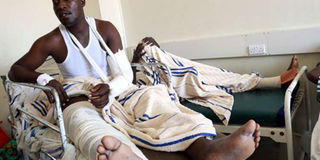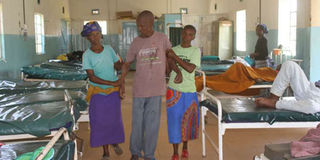My mother would be alive today but for the strike, health worker mourns

Mr Joshua Ouma, a car crash survivor remains unattended to at the Jaramogi Teaching and Referral Hospital, Kisumu County as health workers strike entered day two on December 6, 2016. PHOTO | TONNY OMONDI | NATION MEDIA GROUP
What you need to know:
- Death toll rises to 19 as doctors and health officials fail to agree on deal to end stand-off over pay.
- Doctors have said that only “nuclear weapons” will force them to return to work.
- A union official alleged that those attending the talks were under pressure to prevail upon their striking colleagues to return to work.
- Two patients also died at the Kabarnet County Referral Hospital and one at Kisumu County Hospital.
- In Busia, three people died and one succumbed at the Kisumu County Hospital.
A health worker had nothing but tears as he watched his mother die at a sub-county hospital in Busia as the strike by doctors entered its second day on Tuesday.
Meanwhile, clinical officers, who have also raised their grievances against the Salaries and Remuneration Commission had earlier in the day warned that they would join the strike by doctors at the stroke of midnight.
The death of Mr Godfrey Ngira’s mother at Port Victoria Hospital in Budalang’i, Busia, revealed the high cost of the human suffering that the strike by doctors has exerted on the ailing and their loved ones.
But even as the patients suffered and some died, the doctors’ union demanded that President Uhuru Kenyatta should sack Cabinet Secretary Cleopa Mailu for presiding over the deaths of the innocent patients.
By Tuesday, 12 lives were reported to have been lost at different hospitals across the country, with no signs that doctors and the government were about to agree on a deal to reduce the suffering by ordinary Kenyans who cannot afford costly treatment in private hospitals.
By Tuesday evening, talks between representatives of the Kenya Medical Practitioners, Pharmacists and Dentists’ Union (KMPPDU) and the government appeared to have hit a deadlock.

Alikungu Mubusia on his hospital bed at Mbagathi Hospital in Nairobi on December 6, 2016. PHOTO | DENNIS ONSONGO | NATION MEDIA GROUP
Whereas the government representatives wanted the doctors to agree on a return-to-work formula, the doctors insisted on the conclusion of talks on their collective bargaining agreement that has been delayed since 2013.
On Tuesday, a union official alleged that those attending the talks were under pressure to prevail upon their striking colleagues to return to work.
Mr Ngira, himself a health worker at Alupe hospital in Teso South, said his mother died after battling with stroke and high blood pressure.
“The strike has claimed the life of my mother,” he said.
PATIENTS ON THEIR OWN
Another family from Budalang’i was also mourning Almerida Onyiso, who died shortly after being discharged from Port Victoria Hospital.
On Tuesday, helpless patients in pain begged the striking doctors to return to work.
In many hospitals, the wards were nothing more than halls of despair, with patients left to their own devices and others at the mercy of relatives and hospital support staff, such as security guards.
Doctors have said that only “nuclear weapons” will force them to return to work.

Family members leave the Coast Provincial General Hospital in Mombasa County with their patient on December 5, 2016 as the nationwide doctors' strike started. PHOTO | WACHIRA MWANGI | NATION MEDIA GROUP
As the stand-off over their working conditions persisted, three patients died at the Meru Teaching and Referral Hospital, three others at the Coast General Hospital and a similar number in three separate hospitals in Busia County. Two patients also died at the Kabarnet County Referral Hospital and one at Kisumu County Hospital. This raised the number of patients who have died since the strike started on Monday to 19.
In Meru, the county health chief officer, Dr James Gitonga, said three patients on palliative care for cancer died at the Meru Teaching and Referral Hospital as 11 others were left unattended. The abandoned patients were in pain, with Ms Jerusha Nkatha complaining that she had not received her medication.
“No nurse or doctor has come to check on us since Monday morning. Please tell the nurses to come back,” she pleaded.
Dr Gitonga said 28 patients from the medical wards and 21 from the surgery wards would be transferred to private hospitals.
“We have also called relatives of 15 psychiatry patients to pick them up. At the maternity, we only had one patient and she has been discharged,” he said.
In Mombasa, staff at the Coast General Hospital said they saw two of the three bodies removed from the ward on Monday night. Two mortuary attendants wheeled out a third only minutes later.
CONDITION GOT WORSE
“We brought her here on December 2 and she was progressing well with treatment but her condition got worse yesterday (Monday). There were no doctors to attend to her,” said one of the workers.
But Mombasa Health Executive Mohammed Abdi said only two patients had died.
“This morning we have had two deaths in the medical wards which is a normal event in medical cases,” he said. However, he acknowledged that the strike had crippled services at public hospitals within the county.
In Busia, three people died and one succumbed at the Kisumu County Hospital.

Relatives help a patient to leave the Kisii Teaching and Referral Hospital as the nationwide strike by doctors entered its second day on December 6, 2016. PHOTO | BENSON MOMANYI | NATION MEDIA GROUP
Mr Rashid Odour, 28, died at the Busia County Referral Hospital after failing to get treatment. His relative, Mr Wilson Oduor, said that Rashid, who had been receiving treatment in the male medical ward for two days, died at mid night, without medical attention.
“We were left alone with no one to attend to him. We appeal to the government to end the stalemate before things get out of hand,” said Mr Oduor.
Busia medical superintendent David Mukabi said a total of 15 patients are still at the hospital waiting to be discharged.
“Some patients have accumulated bills, which must be cleared before we allow them to leave,” he said.
In Nakuru, at least five bodies were taken to the Nakuru County Mortuary on Tuesday as the health workers’ strike continued to take a toll.
A worker at the mortuary, who requested not to be named, told the Daily Nation that the bodies had been taken there by Tuesday afternoon from various hospitals in the county.
ADMINISTER OXYGEN THERAPY
When the Nation team visited the mortuary, it found the body of a man who had been hit by a speeding vehicle.
Efforts to reach the Nakuru Level Five Hospital Medical Superintendent, Mr John Murima, for a comment were futile as his phone was switched off.
The hospital is the main referral centre for patients from Nyandarua, Narok, Samburu, Laikipia, Baringo and Kericho counties.
By Tuesday, some patients were still making their way to the hospital hoping to be served.
In Baringo, 25-year-old Janet Barkolwa was left to administer oxygen therapy on her ailing one-year-old son at the Kabarnet County Referral Hospital.
Fighting back tears, she narrated how she struggled with the device in a desperate attempt to save the life of her son, Lemeiyan Barkolwa, who has acute pneumonia.
“The striking doctors left the oxygen equipment next to us and left. My baby needed it and I had to learn how to operate it from well-wishers,” she said.
“Things are not good here because my baby is seriously sick yet he has not been attended to since the strike began on Monday. I did not even sleep well on Monday night because my son also fainted for lack of medical attention at one point,” said the sobbing mother.
In Mandera, Mrs Amina Abdi, 35, who had a still birth, had surgery on Monday.
“The doctor checked on me in the morning but my relatives are around to assist me,” said Mrs Abdi, who was left to heal.
Another patient, Mrs Farush Abdi, underwent a Caesarean section on Sunday and said doctors have been checking on her.
Reports by Kennedy Kimanthi, Rebecca Okwany, Linet Wafula, Eric Matara and Florah Koech




